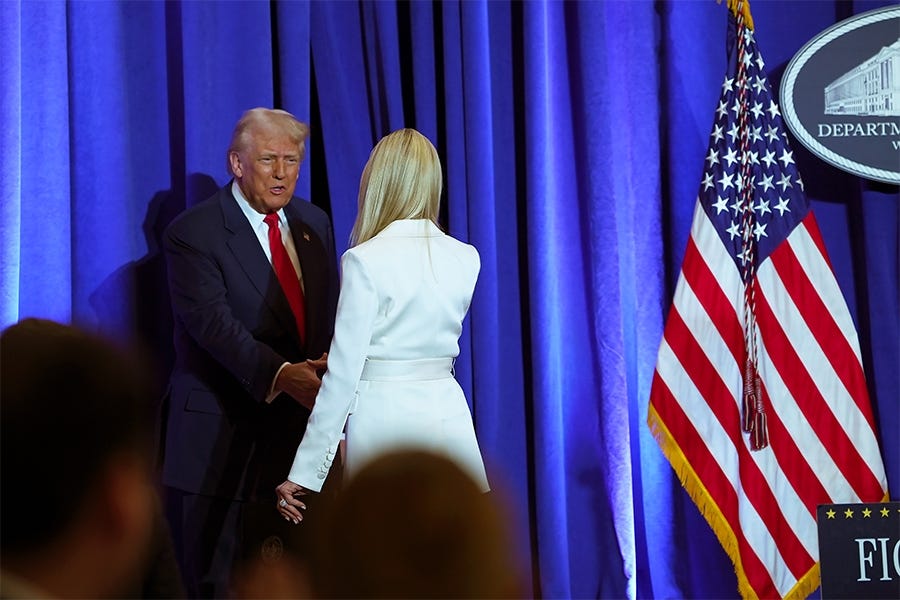
I wrote a few weeks ago about the illegality of President Trump’s refusal to enforce the TikTok ban. Today we learned how the administration accomplished this non-enforcement. It was through an astounding assertion of executive power—maybe the broadest I have ever seen any president or Justice Department make, ever, in any context—and that is saying something.
Congress enacted the TikTok ban by large majorities, President Biden signed it, and the law came into effect the day before Trump became president. On January 20, Trump issued an executive order, twice extended, that ordered the attorney general to not enforce the ban and to ensure that relevant companies ignored the ban despite broad potential liability for violating it. The law bans TikTok in an effort, as the Supreme Court said in upholding the law, to “prevent China—a designated foreign adversary—from leveraging its control over ByteDance Ltd. to capture the personal data of U. S. TikTok users.”
Today the letters by the attorney general effectuating this non-enforcement were released via FOIA. The released letters are written to Apple, Google, Akamai, Amazon, Digital Realty Trust, Fastly, Microsoft, T-Mobile, Oracle, and LG Electronics USA and cover different time periods in which the attorney general lifted the TikTok ban.
These letters reveal more than before about the administration’s legal logic. They say different things but a common theme is that the ban interferes “with the execution of the President's constitutional duties to take care of the national security and foreign affairs of the United States.” I cannot imagine how a congressional decision to protect U.S. users from Chinese control burdens an Article II presidential prerogative related to national security. And Bondi does not say. Congress has obvious authority to enact this law under the Commerce Clause.
The logic of the letter seems to be: The law touches on national security and foreign affairs; I, President Trump, do not like the law; therefore, I need not enforce it. That logic would enable the president to not enforce (and presumably not comply with) every one of the many, many hundreds of statutes that touch on foreign relations or national security—just because the president does not like the law.
That is astounding enough. But the letters go far beyond non-enforcement by the executive branch. Consistent with the EO, they say that the companies have “committed no violation of the Act,” even though they have, and “may continue to provide services to TikTok,” even though the statute says that they cannot. The attorney general in several letters also purports to “irrevocably relinquish[] any claims” that the United States has against the companies—indefinitely into the future, including by other administrations.
This is called the “dispensing” power, which Zachary Price properly described as “the authority to license illegal conduct.” As Price explains, it is a “deeply rooted constitutional tradition” that “American Presidents, unlike English kings, lack authority to suspend statutes or grant dispensations that prospectively excuse legal violations.” The Supreme Court said in Kendall v. United States in 1838 that “a dispensing power . . . has no countenance for its support in any part of the Constitution.” The absence of a presidential dispensing power has been a bedrock principle of conservative originalist thinking, as this testimony by Josh Blackman, this article by John Yoo and Robert Delahunty, and this book by Michael McConnell, make clear.
The dispensing power asserted in these letters is functionally close to a retroactive and prospective civil pardon power for anyone the president wants to allow to violate a statute related to national security or foreign affairs. Think about that.
I am not sure how much the Justice Department examined or thought through this rationale, and it is possible that the rationale will be limited to the TikTok context. Unfortunately, that is not the way executive branch precedents tend to work. And even if this is a one-off, it is still remarkable that the president and the attorney general have asserted a power to wipe out the effects of any law related to national security or foreign affairs on the president’s say so. Trump and Bondi have done what the Court worried about in Kendall: “cloth[ed] the President with a power entirely to control the legislation of Congress and paralyze the administration of justice.”
Alan Rozenshtein has explained why it is hard to find a plaintiff with standing to sue to test the president’s action here. That leaves Congress, which has shown itself utterly uninterested in protecting its prerogatives.




